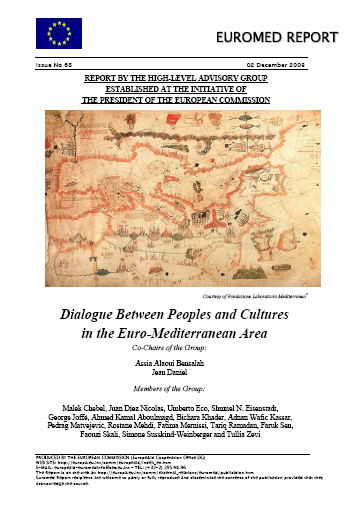|
|
 |
|
REPORT
BY THE HIGH-LEVEL ADVISORY GROUP
ESTABLISHED AT THE INITIATIVE OF
THE PRESIDENT OF THE EUROPEAN COMMISSION
"The Dialogue
between Peoples and Cultures in the Euro-mediterranean Areas"
Members of
the Group: Malek Chebel, Juan Diez Nicolas, Umberto Eco, Shmuel
N. Eisenstadt, George Joffé, Ahmed Kamal Aboulmagd,
Bichara Khader, Adnan Wafic Kassar, Pedrag Matvejevic, Rostane
Mehdi, Fatima Mernissi, Tariq Ramadan, Faruk Sen, Faouzi Skali,
Simone Susskind-Weinberger and Tullia Zevi
|
It is difficult to consider
the Mediterranean as a coherent whole without taking account
of the fractures which divide it, the conflicts which are
tearing it apart: Palestine, Israel, Lebanon, Cyprus, the
western Balkans, Greece, Turkey, Algeria; incidents with their
roots in other, more distant wars such as those in Afghanistan
or Iraq, and so on. The Mediterranean is made up of a number
of sub-units which challenge or refute unifying ideas. Conflict,
however, is not inevitable; it is not its predestined fate.
It is this that convinced Romano Prodi, the President of the
European Commission, to set up a High-Level Advisory Group.
The group set its work on the dialogue between peoples and
cultures in the broader context of economic globalisation,
enlargement of the European Union, the permanent presence
on its soil of communities of immigrant origin, and the questions
about identity which these changes are throwing up on both
shores of the Mediterranean.
Enlargement is causing the European Union to reflect on both
its identity and its relationship with the rest of the world,
starting with the countries and regions in close proximity.
The neighbourhood policy is the creative expression of the
vision of making the Union one element in good neighbourly
relations – as well as being specifically responsible
for providing the neighbourhood with a stable core and therefore
ensuring that it maintains closer links with its immediate
"ring of friends".
The Mediterranean countries which do not belong to the European
Union, however, are exposed to many forces which thwart their
potential to form a single entity and make the voice of their
peoples heard. Their proximity to their northerly neighbour
– whose strength is in large part due to its unification
– may incline them to an equally creative openness to
better, more intense and more egalitarian relations.
|
|
|



